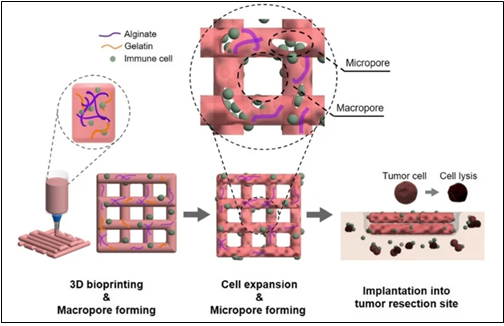A 3D bioprinting technology has been successfully developed, revolutionising the field by enabling the elimination of cancer cells through the functional utilisation of immune cells.

By encapsulating Natural Killer (NK) cells in 3D-printed hydrogels, the loss of NK cells is prevented, and most of these cells can effectively target tumour cells. The hydrogel forms pores, releasing NK cells that maintain viability over time and enable immune functions. While NK cells are commonly used in immunotherapy, intravenous NK cells have proven ineffective in clinical trials for solid tumours. This is due to the challenge of maintaining viable NK cell levels and their inability to target solid tumours effectively.
In collaboration, the Korea Research Institute of Bioscience and Biotechnology (KRIBB) and the Korea Institute of Machinery and Materials (KIMM) have developed a novel 3D bioprinting technology utilising NK cells for cancer immunotherapy. A groundbreaking three-dimensional (3D) bioprinting technology has been created, enabling the utilisation of immune cells to eliminate cancer cells. This innovative technology marks the first of its kind worldwide.
NK cells, a type of leukocyte, exhibit a response to the virus and tumour cell formation. They possess the ability to eliminate harmful cells within the human body selectively. Unlike viruses that invade from the outside, NK cells target internally infected cells and remove them to maintain the body’s well-being. For tumour immunotherapy, NK cells are encapsulated within hydrogels using 3D bioprinting, which incorporates micro/macropore formation. This breakthrough presents a new approach to cancer treatment and demonstrates the collaborative efforts of these institutes under the Ministry of Science and ICT.
The newly developed technology enables injecting NK cells into the hydrogel, which is then printed and cultured in a 3D environment. This innovative approach enhances the viability and activity of NK cells, empowering them to combat cancer tissues effectively. The researchers believe that this technology has the potential to significantly improve the functionality of NK cells employed in cancer treatment.
The researchers have high expectations that this newly developed technology will significantly contribute to the treatment of cancer patients.
Reference: DOI 10.1186/s40824-023-00403-9






